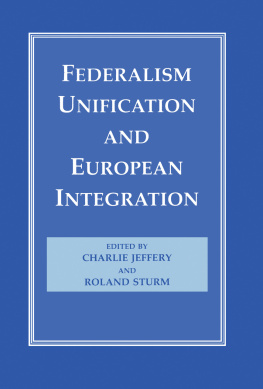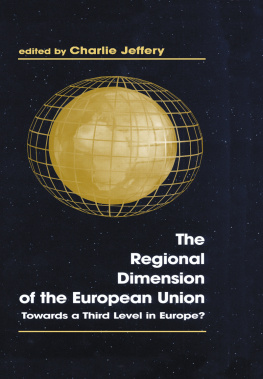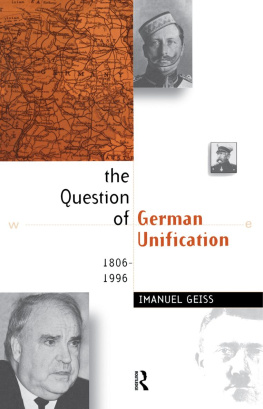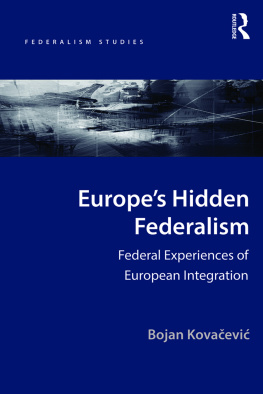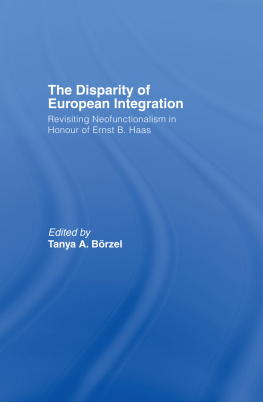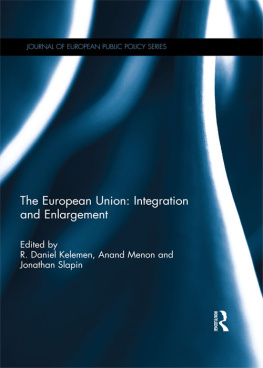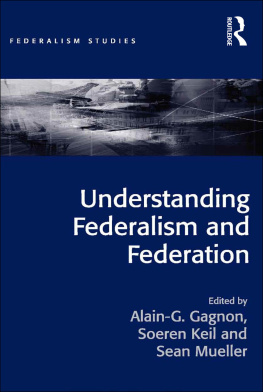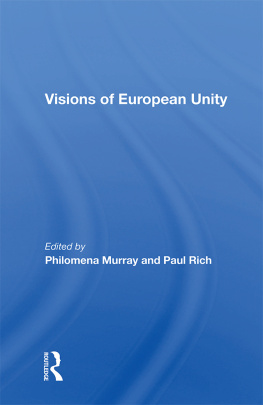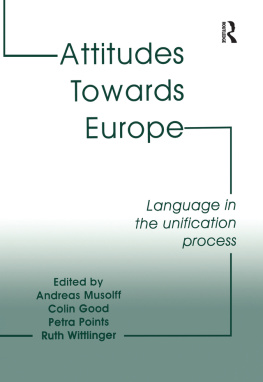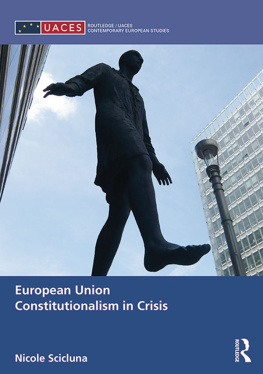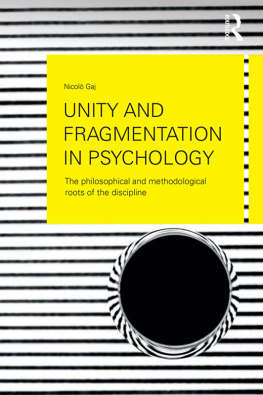First published in 1993 by
FRANK CASS & CO. LTD
This edition published 2013
by Routledge
2 Park Square, Milton Park, Abingdon, Oxon, OX14 4RN
711 Third Avenue, New York, NY 10017
Routledge is an imprint of the Taylor & Francis Group, an informa business
Copyright 1993 Frank Cass & Co. Ltd
British Library Cataloguing in Publication Data
Federalism, Unification and European Integration
I. Jeffery, Charlie II. Sturm, Roland
320.943
ISBN 0-7146-4507-9
Library of Congress Cataloging-in-Publication Data
Federalism, unification and European integration / edited by Charlie Jeffery and Roland Sturm.
p. cm.
This group of studies first appeared in a special issue of German politics, vol. 1, no. 3 (December 1992)t.p. verso.
Includes bibliographical references.
ISBN 0-7146-4507-9: $35
1. Federal governmentGermany. 2. GermanyPolitics and government. 3. GermanyHistoryUnification, 1990. 4. EuropeEconomic integration. I. Jeffery, Charlie. II. Sturm, Roland.
JN3971.A38S835 1992 92-2459
321.02'0943dc20 CIP
This group of studies first appeared in a special issue of German Politics , Vol. 1, No. 3 (December 1992). [Federalism, Unification and European Integration].
All rights reserved. No part of this publication may be reproduced in any form or by any means, electronic, mechanical, photocopying, recording or otherwise, without the prior permission of the publisher.
Typeset by Regent Typesetting, London
This collection grew out of a conference held by the Association for the Study of German Politics in May 1992 at the Goethe-Institut, London. The conference papers have been revised and updated for publication and supplemented by a number of contributions from authors commissioned to investigate and develop further aspects of the issues surrounding Federalism, Unification and European Integration.
The aim or the collection is above all to point out and assess the implications which have arisen and will arise for the German federal system following the achievement of German and the deepening of European unity. The contributions, written by a combination of policymakers and political scientists, focus in particular on the problems which have emerged from the perspective of the Lnder following the incorporation of the former GDR into the Federal Republic and the progressive incursions of the European Community into policy areas formally reserved to the Lnder by the Basic Law.
The first contribution, by Hartmut Klatt, otters a general survey of the issues which have arisen concerning the federal system since unification. He examines in particular the competing perspectives federation and Lnder have developed on the need to reform the federal system in the light of unification and on the methods through which reform might be carried out. Some of the themes Klatt raises are then amplified in the following two articles. Ulrich Exler gives a detailed account of the often somewhat frantic negotiations conducted by federation and Lnder during 1990 on the question of finance: both on how to co-finance the commitments the incorporation of the new Lnder into the Federal Republic would create, and on how the new Lnder might be incorporated on a provisional basis into the systems of vertical and horizontal financial equalisation. Next, Arthur Benz discusses the question of territorial reform in the Federal Republic, outlining the arguments which are conventionally employed in support of territorial adjustment, but also emphasising the entrenched opposition to such reform which exists in those parts of Germany most likely to be affected. In view of this opposition, he then discusses potential alternatives to territorial reform which would involve a greater degree of horizontal coordination between bordering Lnder, focusing in particular on current developments on these lines in the north of West Germany.
Charlie Jeffery and John Yates examine how the Lnder governments have sought to respond to the challenges of unification and deeper European integration. In an analysis of two key documents produced by the Lnder governments the first prior to unification and the second in the run-up to the EC Intergovernmental Conferences at Maastricht Jeffery and Yates point to a dual strategy aimed, in line with the traditions of the Federal Republic, not just at reasserting and defending areas of exclusive Lnder sovereignty vis--vis federation and Community, but also at claiming a greater role in the exercise of the competences of federation and EC wherever these impact on the interests of the Lnder.
Reimut Jochimsen and Roland Sturm focus in their contributions on the problems and opportunities which exist for the Lnder in todays Community. Jochimsen outlines the strategy North Rhine-Westphalia has developed over the last two decades for promoting structural economic adjustment. This involves infrastructural investment, the promotion of research, especially into new technology, and the promotion of the small business sector rather than traditional forms of subsidy-based structural policy. Such a strategy can act, he asserts, as an ideal basis for maintaining regional economic competitiveness in a Europe of the Regions. Sturm takes a rather different perspective by indicating how Community regulations have restricted the leeway of the Lnder to pursue traditional forms of regional industrial policy at the same time as by and large denying the (western) Lnder access to the programmes and resources of the European Regional Development Fund. He does, though, point to an increased emphasis on developing new forms of industrial policy in the Lnder, similar to the North Rhine-Westphalian strategy Jochimsen outlines, which have allowed at least some of the Lnder to make use of those autonomous powers left to them.
Uwe Leonardy discusses the development of the constitutional rights and the institutional participation of the Lnder in the Federal Republics foreign relations. He then focuses on the discussions currently being conducted between federation and Lnder on the strengthening of the constitutional powers of the Lnder in both foreign treaty-making and European affairs, as made necessary in particular by the proposals of the Maastricht Treaty on European Union. The emphasis is reversed in David Spences contribution, which examines the European Communitys response to German unification. He focuses on the key role played by the Commission in preparing the ground with remarkable speed and flexibility for the incorporation of the former GDR into the Community, and also points to the link which emerged between unification and the deepening of the integration process beyond the completion of the Internal Market.
In the final contribution, Roland Sturm and Charlie Jeffery review the major themes developed throughout the collection. They discuss the problems posed for the federal system by unification and deepening European integration and assess whether these are likely to lead to a revival of the characteristic cooperative federalism of the Federal Republic or an alternative scenario in which the Lnder no longer prove able to provide a strong counterweight to the federal level.
It would be appropriate at this point to offer the thanks of the Association for the Study of German Politics to the Anglo-German Foundation, in particular Dr Connie Martin and Dr Ray Cunningham, and to the Goethe-Institut and its Director Dr Elmar Brandt, without whose generous support this collection, and the conference from which it arose, would not have been possible. Thanks are also due to the Centre for Federal Studies at the University of Leicester, especially John Yates and Rachel Clarke, for assistance in preparing this collection for publication.


